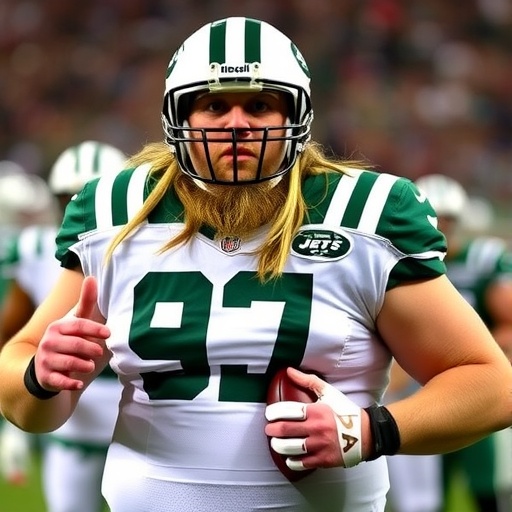Nick Mangold, New York Jets Legend, Dies at 41 After Brave Battle with Kidney Disease
In a shocking loss that has sent ripples through the NFL world, former New York Jets center Nick Mangold has passed away at the age of 41 following a courageous fight against kidney disease. The news, confirmed by Mangold’s family on Wednesday, marks a heartbreaking chapter in the life of one of the league’s most respected linemen, whose on-field tenacity and off-field humility endeared him to fans and players alike. Mangold’s death from complications related to chronic kidney disease comes just months after he publicly shared his diagnosis, inspiring countless others facing similar health battles.
- Mangold’s Rise from Ohio State to Jets Stardom
- The Hidden Toll: Uncovering Mangold’s Kidney Disease Diagnosis
- Heartfelt Tributes from Teammates, Rivals, and the Jets Organization
- Legacy Beyond the Gridiron: Mangold’s Family Life and Post-Retirement Ventures
- Honoring Mangold’s Memory: NFL Initiatives and Future Health Advocacy
Mangold, a seven-time Pro Bowl selection and two-time All-Pro, spent his entire 11-year NFL career with the New York Jets, anchoring the offensive line from 2006 to 2016. His sudden passing has prompted an outpouring of grief, with tributes highlighting not just his athletic prowess but his role as a family man and philanthropist. As the NFL community mourns this NFL death, questions arise about the hidden health struggles of former players and the need for better support systems.
Mangold’s Rise from Ohio State to Jets Stardom
Nick Mangold‘s journey to NFL legend status began far from the bright lights of MetLife Stadium. Born on January 10, 1984, in Centerville, Ohio, Mangold was a standout at Centerville High School, where he excelled in wrestling and football. His talent caught the eye of Ohio State University recruiters, leading him to Columbus in 2002. There, Mangold blossomed into one of the nation’s top centers, starting all 40 games over his final three seasons and earning All-Big Ten honors.
Drafted in the first round (29th overall) by the New York Jets in the 2006 NFL Draft, Mangold quickly proved his worth. As a rookie, he started all 16 games, allowing just one sack and earning a spot on the PFWA All-Rookie Team. Over the next decade, he became the cornerstone of the Jets’ offensive line, protecting quarterbacks like Mark Sanchez and Geno Smith while paving the way for running backs such as Thomas Jones and Shonn Greene.
Statistically, Mangold’s impact was undeniable. According to Pro Football Reference, he started 162 of 166 career games, missing only a handful due to minor injuries. His blocking efficiency was elite; during his prime years from 2008 to 2012, the Jets’ rushing attack ranked in the top 10 league-wide four times, thanks in large part to Mangold’s precise snaps and powerful drive-blocking. Off the field, he was the epitome of professionalism, signing a five-year, $55 million extension in 2011—the richest contract for a center at the time.
Teammates often praised Mangold’s leadership. Former Jets quarterback Chad Pennington once said, “Nick was the glue that held our line together. He wasn’t just a player; he was a coach on the field.” This sentiment echoed throughout his career, culminating in his retirement in 2017 after a brief stint with the Chicago Bears’ practice squad.
The Hidden Toll: Uncovering Mangold’s Kidney Disease Diagnosis
While Mangold’s on-field legacy was built on resilience, his off-field battle with kidney disease revealed a more vulnerable side of the NFL legend. The condition, which Mangold kept relatively private until late 2023, stemmed from a rare genetic disorder that progressed silently over years. Chronic kidney disease (CKD) affects more than 37 million Americans, according to the National Kidney Foundation, but for former athletes like Mangold, the physical demands of the sport may accelerate its onset.
Mangold first noticed symptoms in 2020—persistent fatigue, swelling in his legs, and high blood pressure—initially attributing them to post-retirement weight fluctuations. A routine checkup revealed Stage 3 CKD, where kidney function drops to 30-59% of normal capacity. By 2023, his condition had worsened to Stage 4, prompting dialysis and a search for a kidney donor. In a heartfelt Instagram post last October, Mangold wrote, “This fight isn’t just mine; it’s a reminder that even the strongest among us need support. Grateful for my family and the Jets family that’s rallied around me.”
Experts note that NFL players face elevated risks for kidney issues due to repeated dehydration, NSAID use for pain management, and the toll of high-impact collisions. A 2019 study in the American Journal of Kidney Diseases found that retired NFL players are 2.5 times more likely to develop CKD than the general population. Mangold’s case underscores this statistic; despite his disciplined lifestyle—maintaining a plant-based diet and regular exercise— the disease progressed relentlessly.
Throughout his treatment, Mangold advocated for kidney health awareness. He partnered with the American Kidney Fund, participating in virtual fundraisers that raised over $250,000 for research. His story highlighted the disparities in healthcare access for athletes; while Mangold had top-tier medical care through his Jets alumni network, many former players struggle without it. This NFL death serves as a stark reminder of the long-term health costs of professional football.
Heartfelt Tributes from Teammates, Rivals, and the Jets Organization
The news of Nick Mangold’s passing elicited an immediate wave of tributes, transforming social media into a digital memorial for the New York Jets icon. Jets owner Woody Johnson released a statement saying, “Nick was more than a player; he was the heart and soul of our franchise. His passing leaves a void that can never be filled, but his spirit will inspire generations.” The team announced plans for a moment of silence at their next home game and a charity drive in Mangold’s name to support kidney disease research.
Fellow NFL legends joined the chorus. Hall of Famer and former Jets quarterback Joe Namath tweeted, “Nick Mangold was a warrior in cleats and in life. Rest in peace, brother—your snap will be missed, but never forgotten.” Rival players, including New England Patriots’ retired center Logan Mankins, shared memories of intense matchups: “Facing Nick twice a year was a nightmare for any defensive line. He was tough, fair, and classy—qualities that defined him.”
Fans flooded Jets forums and Reddit threads with personal stories. One supporter recalled, “Mangold was the reason I stuck with the Jets through the tough years. He never quit, even when the team did.” The outpouring extended globally, with international Jets communities in London and Mexico City organizing watch parties to honor his career highlights.
Beyond the NFL, Mangold’s philanthropic efforts drew praise. He founded the Nick Mangold Foundation in 2012, which provided educational resources to underprivileged youth in New Jersey and Ohio. Over 5,000 students benefited from its programs, focusing on STEM education and health literacy—a poignant irony given his own health struggles.
Legacy Beyond the Gridiron: Mangold’s Family Life and Post-Retirement Ventures
Nick Mangold’s life extended far beyond the gridiron, where he cultivated a rich personal world that amplified his status as an NFL legend. Married to Kathryn Giustra since 2013, Mangold was a devoted husband and father to their two young children, often sharing glimpses of family hikes and coaching youth soccer on his social media. In interviews, he credited his family for grounding him: “Football was my job, but home was my sanctuary. They kept me fighting through everything.”
Post-retirement, Mangold transitioned seamlessly into media and business. He joined ESPN as an NFL analyst in 2018, offering insightful commentary on offensive line play during shows like NFL Live. His articulate style and deep knowledge made him a fan favorite; in 2022, he co-hosted a podcast, Snap Count, which garnered over 1 million downloads discussing the evolution of the center position.
Entrepreneurially, Mangold invested in wellness startups, including a line of electrolyte supplements aimed at athletes recovering from intense training—ironically prescient given his kidney health challenges. He also served on the board of the NFL Players Association’s retired player services, advocating for improved health benefits. A 2021 report by the PA revealed that only 60% of retired players had access to comprehensive medical screenings, a gap Mangold worked tirelessly to close.
Mangold’s off-field pursuits painted a picture of a multifaceted man: an avid reader of history books, a volunteer at local food banks, and a supporter of environmental causes through the Jets’ green initiatives. His death at 41 cuts short what promised to be a continued influence in these areas, leaving admirers to reflect on a life lived with purpose.
Honoring Mangold’s Memory: NFL Initiatives and Future Health Advocacy
As the NFL community grapples with this profound NFL death, steps are already underway to honor Nick Mangold’s legacy and address the underlying issues his story illuminated. The New York Jets plan to retire Mangold’s No. 74 jersey in a ceremony next season, ensuring his name echoes through the rafters of MetLife Stadium. Additionally, the league announced a partnership with the National Kidney Foundation to launch the “Mangold Health Initiative,” providing free CKD screenings for 10,000 former players over the next five years.
This forward momentum reflects broader calls for reform. NFL Commissioner Roger Goodell stated in a league-wide memo, “Nick’s battle with kidney disease highlights the sacrifices our players make. We’re committed to enhancing post-career health support to prevent tragedies like this.” Early discussions include mandatory annual kidney function tests for active players and expanded insurance coverage for chronic conditions in retirees.
Fans and advocates are mobilizing too. Online petitions have surged past 50,000 signatures urging Congress to fund more research into sports-related kidney diseases. Mangold’s family, through a spokesperson, expressed gratitude for the support and plans to continue his foundation’s work, with a focus on early detection programs. As the offseason approaches, expect more tributes— from special segments on NFL Network to charity games featuring his former teammates.
In the wake of this loss, Mangold’s story will undoubtedly spur conversations about athlete wellness. His resilience in battling kidney disease, coupled with his exemplary career, positions him as a catalyst for change. The NFL world moves forward, but with Nick Mangold’s influence etched indelibly in its history, ensuring that his fight—and his triumphs—live on.








